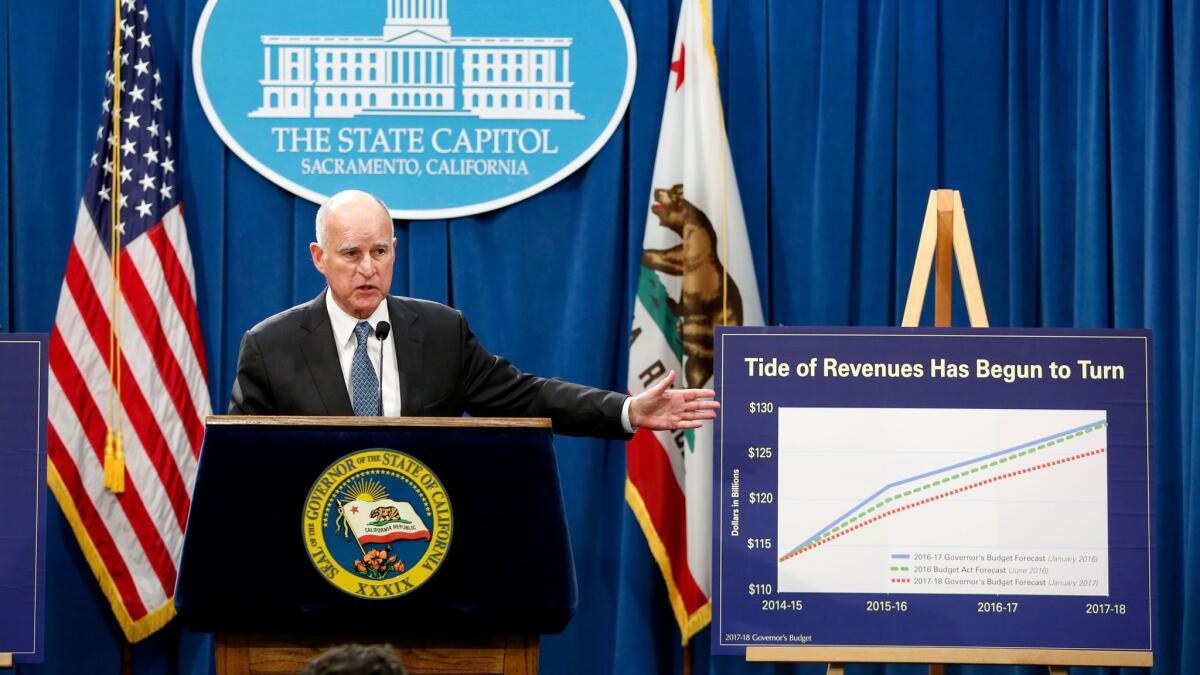What’s hurting California’s budget: The rich aren’t getting richer as fast as they used to

- Share via
Income growth is slowing for the highest-earning Californians.
That’s the single biggest driver of the $1.6-billion deficit projected on a $179.5-billion overall budget by Gov. Jerry Brown on Tuesday. And once again it is raising the question of whether California has grown too reliant on taxing rich people with often wildly fluctuating incomes.
“We are lining ourselves up for a massive budgetary crisis. It’s a function of when and not if,” said Chris Thornberg, co-founder of Beacon Economics, a Los Angeles-based consulting firm. “It’s hard to feel bad for someone whose income goes from $2 million to $1 million in a year, but the reality is that is going to have a tremendous impact on our budget.”
The top 10% of earners — who made an average of $404,184 in 2014 — paid 79% of all personal income tax revenue that year, up from 70% two decades ago.
California is so dependent on high earners to fill state coffers partly because of Proposition 30, a measure approved in 2012 that temporarily raised taxes on people earning more than $250,000. Those rates were set to begin phasing out in 2018, but on Nov. 8 voters elected to prolong them by approving Proposition 55, which extends higher taxes through 2030.
Those propositions “have increased the dependence of the state on a volatile tax base,” said Jerry Nickelsburg, an economist at the UCLA Anderson Forecast.
Supporters of continuing to tax the wealthy at high levels — people earning more than $263,000 in 2015 paid a top state income tax rate of 10.3% — say it’s crucial to keep state money flowing to public services. Although the top 10% may see their income fluctuate from year to year, they point out, rich people have steadily increased their earnings for decades.
“If not this revenue source, then which?” said Jonathan Kaplan, a policy analyst at the California Budget Center. “This was the only game in town, and we believe those who have more resources in the state should carry a bigger burden than those who have less.”
Personal income tax make will make up 69% of total revenue in the state next fiscal year, meaning that the richest people in the state probably will supply more than half of its revenue.
Alternative sources of revenue have their own problems. Some lawmakers and economists have proposed raising property taxes, especially on commercial real estate, but that would require marshaling the Legislature and the voting public to overturn Proposition 13’s limits on property reassessments.
Another option is a tax on services other than rent, utilities and healthcare; Sen. Bob Hertzberg (D-Van Nuys) has introduced two bills to apply such a tax, and both died last year.
The state doesn’t yet have data on how much personal income from the highest earners declined last year. But it does track income from sources other than salaries, which captures the money that the highest earners get when they, for example, sell stocks or cash in on options to buy shares. That type of income dropped 4% in 2016 compared with 2015.
“It’s not growing as fast as expected,” said Irena Asmundson, chief economist at the state Department of Finance.
The slowdown in those windfall earnings is the central factor behind the projected deficit next fiscal year, although slower wage growth in sectors that pay the highest salaries will also dent the budget, Asmundson said.
Industries that typically offer fat paychecks — finance, professional services and information, which includes the movie business and some technology firms — will increase their wages about 1 percentage point less than expected in 2017, the Department of Finance projects.
Personal income overall will grow more slowly in coming years, the department says. It estimates that taxable personal income went up 6.3% in 2015 and projects that it will slow to a 4.4% uptick by 2020.
A sluggish market for new technology stocks could be tamping down the incomes of the richest Californians, Asmundson acknowledged.
Only 21 tech companies last year took the plunge to sell stock for the first time. Those initial public offerings, or IPOs, often generate large payouts to employees and big capital gains taxes for the state.
Existing tech stocks such as those of Menlo Park, Calif.-based Facebook and Santa Clara, Calif.-based Nvidia — a maker of electronics chips for game players and mobile devices whose share price gained nearly 227% last year — held up in a volatile market. But they could face greater challenges this year, which influences the decision by newer companies to go public and could be contributing to the state’s scaled-back outlook.
Meanwhile, Silicon Valley — the source of so much of the state’s wealth — is tightening its belt in other ways.
After about three years of booming investment, venture capital flowing to young companies tumbled 12% nationally in 2016, to $69 billion from a peak of near $80 billion the year before, according to data from the PitchBook research firm. Even companies that raised financing said they were holding large chunks in the bank as a hedge against more difficult fundraising conditions.
Facebook has warned that the number of ads it can show users might max out this year, flattening sales growth. In December, Google parent company Alphabet eschewed its usual holiday bonus of free gadgets for employees in favor of a charitable donation as the Mountain View, Calif., giant continues to exercise greater spending discipline.
And slowing iPhone sales are weighing on Cupertino, Calif.-based Apple, which recorded a revenue decline for the first time since 2001 last year and cut Chief Executive Tim Cook’s pay by about $1.6 million, to $8.7 million, in 2016.
The state can look to the expected IPO of Snapchat developer Snap Inc. in coming months as a big tax event. But the Venice company’s windfall will be much smaller than that of the 2012 Facebook IPO. Facebook at the time had double the number of employees and as much as quadruple the valuation.
People may have deferred income, and state and federal taxes, late last year in hopes of favorable policy changes under the Trump administration, said David Neighbors, principal at Silicon Valley accounting firm Gallina. Others have shifted their incomes out of California to avoid the state’s high rates under Brown, he said.
“High-net-worth individuals would definitely take advantage of those opportunities,” Neighbors said.
On the other hand, state revenue could at least briefly pick up in the coming months as people cash out of holdings in the hot stock market, he predicted.
More broadly, Brown’s finance department is weighing the possibility that California’s six-plus years of post-recession economic expansion will finally begin to fade.
The state’s current run — five years of more than 2% job growth — puts it well beyond the average length of expansions in the post-World War II era, said H.D. Palmer, a spokesman for the Department of Finance. The dot-com bust of 2001 and the financial crisis of 2008 offer a glimpse into the massive losses that wealthy investors can experience if markets plunge.
“The law of averages suggests that we are due for an expansion to end,” Palmer said.
Independent economists mostly don’t expect the state to fall back into a recession anytime soon, however. They see the post-election upswing in the stock market as a sign that the finances of the wealthy could fare better than expected in 2017.
Not to be discounted is how the tax revenue estimates play into the Brown team’s budget bargaining strategy, said Thornberg, the Beacon Economics co-founder.
“It’s how he opens negotiations — you never put your cards on the table, you start out with a very dismal view,” Thornberg said.
Twitter: @NatalieKitro
Twitter: @peard33
ALSO
Verizon chops unlimited data plans: Big users can switch or be disconnected
‘This is Us’ is TV’s biggest new hit. So why did Fox give it to NBC?
More to Read
Inside the business of entertainment
The Wide Shot brings you news, analysis and insights on everything from streaming wars to production — and what it all means for the future.
You may occasionally receive promotional content from the Los Angeles Times.












